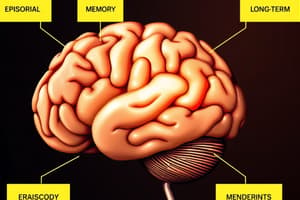Podcast
Questions and Answers
What does the term 'title' refer to in memory research?
What does the term 'title' refer to in memory research?
- The components of Atkinson-Shiffrin's model.
- A method of retrieving information from memory.
- Investigating the sensitivity of different measures of retention of long-term memory. (correct)
- The storage, encoding, and retrieval of information.
Define memory.
Define memory.
Memory is the storage, encoding, and retrieval of information acquired through learning.
What does Atkinson-Shiffrin's multi-store model of memory consist of?
What does Atkinson-Shiffrin's multi-store model of memory consist of?
Sensory memory, short-term memory, and long-term memory.
What is long-term memory?
What is long-term memory?
What is a retrieval method?
What is a retrieval method?
What is a retrieval cue?
What is a retrieval cue?
Define recall.
Define recall.
What is free recall?
What is free recall?
What does recognition entail in memory retrieval?
What does recognition entail in memory retrieval?
What is the sensitivity of measures of retention?
What is the sensitivity of measures of retention?
In McCauley's 2002 research, what did participants learn?
In McCauley's 2002 research, what did participants learn?
What was the aim of the investigation?
What was the aim of the investigation?
State the hypothesis of the study.
State the hypothesis of the study.
How is the independent variable operationalized?
How is the independent variable operationalized?
What does operationalized dependent variable measure?
What does operationalized dependent variable measure?
Who made up the population for the study?
Who made up the population for the study?
Describe the participant selection for the study.
Describe the participant selection for the study.
What materials were used in the study?
What materials were used in the study?
Outline the procedure followed in the study.
Outline the procedure followed in the study.
What ethical consideration was upheld in the study?
What ethical consideration was upheld in the study?
What were the results regarding the mean score of recognition and recall conditions?
What were the results regarding the mean score of recognition and recall conditions?
Was the hypothesis supported or negated?
Was the hypothesis supported or negated?
How does the study link to Atkinson-Shiffrin's multi-store model?
How does the study link to Atkinson-Shiffrin's multi-store model?
Summarize the link to past research.
Summarize the link to past research.
Explain the importance of findings and real-life applications.
Explain the importance of findings and real-life applications.
What is a potential extraneous variable related to experimental design?
What is a potential extraneous variable related to experimental design?
How can familiarity with known words act as a potential extraneous variable?
How can familiarity with known words act as a potential extraneous variable?
Define reliability in the context of this study.
Define reliability in the context of this study.
What are internal and external validity in the context of this study?
What are internal and external validity in the context of this study?
Flashcards are hidden until you start studying
Study Notes
Recall vs Recognition in Long-Term Memory
- Investigates sensitivity of memory retention measures, specifically recall and recognition.
- Memory encompasses encoding, storage, and retrieval of learned information, represented neurologically.
Atkinson-Shiffrin's Multi-Store Model
- Memory consists of three components: sensory memory, short-term memory, and long-term memory.
Long-Term Memory
- Holds vast information for prolonged periods, potentially unlimited.
- Retrieval cues facilitate access to stored information.
Retrieval Methods and Cues
- Retrieval methods include recall, recognition, and relearning.
- Retrieval cues are stimuli that help locate specific stored information.
Recall vs Free Recall
- Recall reproduces stored memory with minimal cues.
- Free recall involves reproducing as much information as possible, without order.
Recognition
- Involves identifying correct information among alternatives.
- Generally offers more cues than recall, enhancing retention measures.
Sensitivity of Measures of Retention
- Recognition is more sensitive due to increased retrieval cues provided compared to recall.
Previous Research (McCauley 2002)
- Participants learned 100 nonsense syllables under recall or recognition conditions.
- Free recall yielded an average of 52 syllables remembered, while recognition yielded 87, demonstrating recognition's superiority in retention.
Aim and Hypothesis
- Aimed to investigate how different retrieval methods affect long-term memory retention.
- Hypothesis states that recognition will yield a higher mean word retrieval than recall.
Operationalized Variables
- Independent Variable: Method of retrieval (free recall vs recognition).
- Dependent Variable: Mean number of correct words recalled or recognized.
Participant Sampling and Characteristics
- Convenience sampling used, accessing adults in Victoria associated with psychology students.
Materials and Procedure
- Included informed consent forms, word lists, recognition sheets, timing tools, and raw data records.
- Detailed procedure outlined participant instructions, word learning time, and collection of results.
Ethical Considerations
- Informed consent was adequately upheld.
- Debriefing was violated, as participants were not informed about the study's full nature or offered support after.
Results and Implications
- Recognition condition yielded a higher mean score than recall, affirming recognition's effectiveness.
- Findings align with Atkinson-Shiffrin's model, emphasizing retrieval cues’ importance in memory recall.
Study Findings Significance
- Recognition assessments benefit educators in evaluating student memory through multiple-choice formats.
- Highlights the necessity of appropriate retrieval methods in memory studies to access stored information.
Potential Extraneous Variables
- Individual memory capabilities could affect recall and recognition results.
- Familiarity with words also represents a potential bias, which was mitigated using nonsense syllables.
Reliability and Validity
- Reliability concerns noted due to single trial; suggests need for replication to establish dependability.
- Internal validity challenged by extraneous variables; external validity limited due to convenience sampling, requiring random sampling for generalization.
Studying That Suits You
Use AI to generate personalized quizzes and flashcards to suit your learning preferences.




